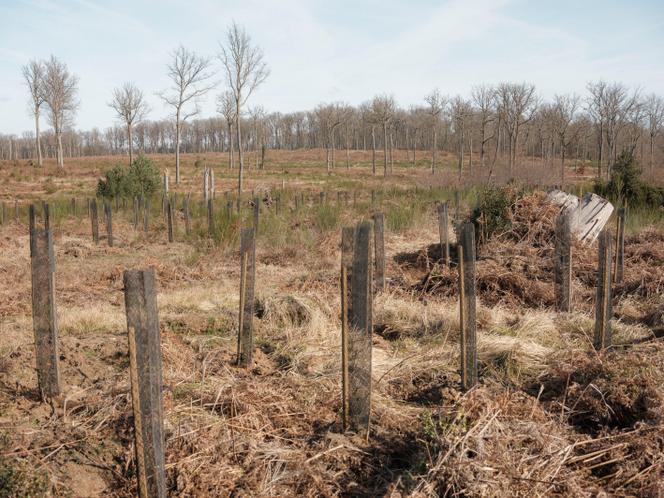


Only 939 million left to go. Since 2020 and the launch of the forestry component of the France Relance stimulus program, some 61 million trees have been planted in France. Presented at the time as "an unprecedented effort," initially, 50 million trees were planned. Since then, the speed of the planting has shifted. At the end of October 2022, after a summer marked by exceptional wildfires, French President Emmanuel Macron announced that he wanted to plant 1 billion trees in 10 years, a goal since often cited by the government as proof of its commitment to biodiversity. Renewing 10% of forests is "feasible, and it's even what we should be doing," Macron said. "It's a tremendous ecological, environmental and development project."
On paper, the promise is seductive. Battered by fire, drought and disease, forests appear more valuable than ever, whether for sequestering carbon, protecting biodiversity, supplying materials or energy. The French president is not alone in his commitment to forests. Accounting for 25% of the forest area created in the last 10 years, the United States, the European Union and China have all launched planting programs.
One year on from the French president's announcement, nature conservation NGOs, scientists and foresters are nonetheless concerned about the conditions under which it's going to be implemented. They're apprehensive about a "simplistic" approach, pushing for numbers at the expense of preserving existing ecosystems and biodiversity. These fears have been fuelled by an assessment of the France Relance post-Covid recovery plan and the publication of a report setting out government guidelines for forest renewal.
Entitled "Objectif Fôret" (Objective Forest) and drafted by a specialized committee of the Forest and Woodland High Council (CSFB), the report, published at the end of July, supports the 10% forest renewal target. "The scale and speed of global change is going to exceed the natural adaptive capacities of these ecosystems," wrote its members, representing all stakeholders. "Forests must therefore be adapted or reconstituted, at the risk of not being able to provide the various services they provide today in the future."
Sharply rising tree mortality, massive dieback, slower growth... All the signs are alarming with regard to the state of forest health. Faced with this observation, most of those involved agree on the need for more intervention. "We've been calling for a strategic fund for a long time now," said Antoine d'Amécourt, president of the Fransylva private forest owners' association. "With global warming, it's even more essential now. I'm not worried, there's going to be room for all these trees."
You have 70% of this article left to read. The rest is for subscribers only.
